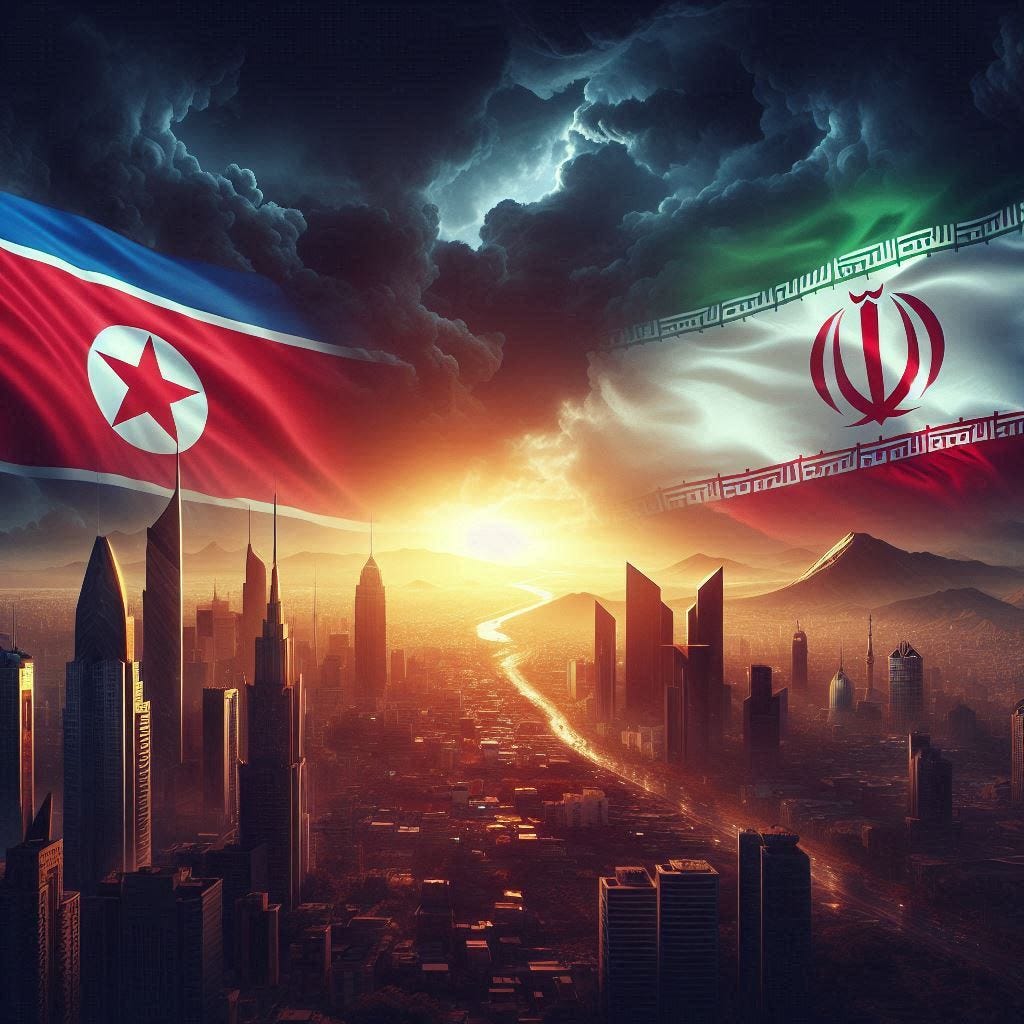Opium more prevalent than meth in NK; New DPRK TEL; Iranian ballistic missiles to Russia; Tehran using criminal networks to intimidate dissidents
Prohibited Transactions for the week of 9 September 2024 (#61)
This image was created in Microsoft Copilot Designer on 14 September 2024 using the prompt “North Korean and Iranian flags in the distance, dark art”
//Hi everyone, thanks for reading! I just wanted to quickly say that Prohibited Transactions will be going on indefinite hiatus. The Substack page with the archive will remain up, but this will be the last new issue for a while.
My goal with Prohibited Transactions was to produce something that I myself would want to read when trying to better understand how the illicit networks in North Korea and Iran operate. I have always believed that these illicit networks are shaped not only by international pressure from sanctions and law enforcement actions, but also the domestic political and bureaucratic environments they originate from and operate in. I hope that the newsletter has been able to shed a bit of light on this.
North Korea
New research by the Conflict Armament Research (CAR) group revealed that some North Korean ballistic missiles used in Ukraine were manufactured in 2024. //This is the first public evidence that some missiles produced this year have made their way to the battlefields in Ukraine. See issues #35 and #38 for CAR’s previous research.
In North Korea, opium has become the drug of choice as the raw materials needed to make methamphetamine could not be delivered from the PRC following border lockdowns at the start of the COVID-19 pandemic. North Korean farmers instead started growing poppies used to make opium, and sold it on the black market. Though trade has resumed between the two countries, there is still not a consistent stream of supplies for the production of meth, which previously was widely used in the DPRK. //The issue of meth along the border regions is a longstanding one, and it’s not yet clear if opium will replace meth in the long term inside North Korea.
--
The DPRK unveiled a new 12-axel transporter erector launcher (TEL), which could indicate that the North is developing even larger missiles for use. //Previously, the DPRK had imported heavy-duty vehicle chassis from the PRC and modified them into TELs.
Iran
The US government told allies and publicly stated that Tehran transferred short-range ballistic missiles to Moscow for use in Ukraine. In response, the US sanctioned 10 individuals and six entities based in Iran and Russia for their roles for delivering the munitions from Tehran to Moscow. France, Germany, and the UK (the E3) stated that they will be issuing new sanctions against Iran, as well as canceling bilateral air services agreements with Tehran.
A particular focus for the US and its allies is on Iran’s flag carrier, Iran Air, which the US says has had a history of transport goods on behalf of Iran’s military, and the Islamic Revolutionary Guard Corps (IRGC).
Tehran denied sending ballistic missiles to Russia and stated they would deliver a “symmetrical and proportionate” response to the E3’s canceling of the air services agreements.
A Russian cargo ship suspected of carrying Iranian ballistic missiles to Russia was seen via satellite imagery at a Russian port last week, after previously docking at an Iranian port at the end of August.
According to a Russian official, Moscow is imminently prepared to sign a new bilateral treaty with Tehran.
Iraqi banks used a US-created money transfer system established after 2003 to move funds to Iran, including to the IRGC-Quds Force. The New York Federal Reserve, which held Iraq’s earnings from oil sales, made bulk cash shipments to Baghdad, as well as processed commercial wire transfers from Iraq’s banks for the purposes of international trade. However, because Iraqi banks didn’t have many connections with the outside world, funds would be transferred via SWIFT as bank-to-bank transfers, which did not require information on the ultimate beneficiary of the funds. Iraq’s central bank stated that the goal by the end of 2024 is for all outbound international transfers to be made via correspondent banks and not the New York Fed. There is currently a pilot program for US dollar transfers via Citibank. //The issue of Iraqi banks being used by the Iranians is not a new one (see Issues #37, #15 and #13), but this WSJ article helps show the scope and brazenness of the activity.
Iran had turned to international criminal organizations to attack or intimidate critics of Tehran. By using criminal proxies to carry out assassinations, abductions, and attacks, it becomes more difficult to attribute the action to Iran, can reduce the risks to Iranian covert operatives, and limits the blowback in case the operation fails. Iran has outsourced these operations to the Hells Angels biker gangs, Russian mob networks, drug syndicates and other violent criminal groups from around the globe. //This reminds me of a podcast, Lethal Dissent, which explores how Tehran intimidates Iranian exiles based in Turkey, and uses Turkish networks to try to kidnap dissidents and return them to Iran.
--
The PRC’s COSCO Shipping Group has signed agreements with Iranian companies to construct 42 bulk carriers for USD2 billion. The vessels will be delivered between 2026 and 2027.
Iran’s oil minister said that the country “can play the role of a crossroad for energy trade and transit in the region.”
Pakistan’s minister of energy said that international sanctions is causing issues with the long-planned Iran-Pakistan (IP) pipeline (see Issue #60).

